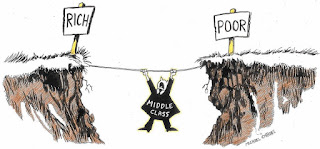Properly understood, the middle class is the source of all growth and prosperity in a modern technological economy.
There was six great Chinese civilizations and all of them collapsed for the same reason. Small rural villages would eventually become towns, and towns into districts, and districts into a country. The emperor would be benign and rule fairly. Small businesses prospered and and a well-off middle-class emerged.
Some businesses grew larger and a new merchant class emerged, but they started forming semi-monopolies, lowering wages and putting out of business the competition. They also influenced the emperor to lower taxes on themselves and shift them onto everyone else, while encouraging the emperor to start expensive wars of conquest.
With the middle-class hollowed out and wages plummeting, the Chinese people lost their purchasing power and eventually their great civilization would collapse. Civil war would always follow. The Chinese knew why their civilizations collapsed, but could never do anything to stop it.
Nick Hanauer and David Rolf say how in neoclassical economics it is considered that the rich drive prosperity through their innovation and entrepreneurship, but that's only part of the story, a prosperous middle-class is really the main driver of a healthy ecomomy.
Many conservative and libertarians believe in the power of the individual, but if the masses have no security and are all on their own, how can they afford to spend when they need to save their money for a rainy day, because no one is going to help them out if it all goes wrong?
Conservatives and libertarians believe fear is a big motivater for hard work, but punishment is never as effective as reward, as fear wears you down causing you to lose motivation.
The American middle class is facing an existential crisis. For more than three decades, declining wages, fraying benefits, and the rising costs of education, housing, and other essentials have stressed and squeezed middle-class Americans. But by far the biggest threat to middle-class workers—and to our economy as a whole—comes from the changing nature of employment itself.
Gone is the era of the lifetime career, let alone the lifelong job and the economic security that came with it, having been replaced by a new economy intent on recasting full-time employees into contractors, vendors, and temporary workers. It is an economic transformation that promises new efficiencies and greater flexibility for “employers” and “employees” alike, but which threatens to undermine the very foundation upon which middle-class America was built. And if the American middle class crumbles, so will an American economy that relies on consumer spending for 70 percent of its activity, and on a diverse and inclusive workforce for 100 percent of the innovation that drives all future prosperity.
Economics

No comments:
Post a Comment